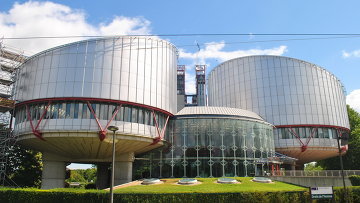MOSCOW, December 23 (RAPSI, Ingrid Burke) - The European Court of Human Rights (ECHR) addressed a series of questions to the parties to a case launched by the newly released Pussy Riot members challenging Russia on the basis of various alleged rights violations associated with their detention and legal process, according to court documents released by the court.
Pussy Riot members Nadezhda Tolokonnikova, Maria Alyokhina, and Yekaterina Samutsevich filed a complaint with the ECHR on June 19, 2012 alleging various violations of the European Convention of Human Rights (Convention).
According to the ECHR documents, the applicants assert that the conditions of their transportation to and from the court during their trial, as well as the treatment sustained during hearings and the fact that they were seated in a glass dock in the courtroom constituted violations of the Convention’s Article 3 prohibition against torture and inhuman treatment.
They further asserted a violation of Article 5, Section 3 of the Convention, which states that anyone validly arrested or detained should be guaranteed a timely trial, or granted the right to release after trial. The applicants argue that there were no valid grounds requiring their remand in custody.
They allege that in violation of the Convention’s Article 6 guarantee of the right to a fair trial, they were unable to challenge expert testimonies based on the trial court’s refusal to call on either the experts that wrote the report or on rebuttal experts. They further claim that they weren’t able to effectively defend themselves due to an inability to communicate with their lawyers freely and privately during or following the hearings.
They argued that their Article 10 rights to freedom of expression were violated based on the allegation that their detention and conviction constituted a “gross, unjustifiable and disproportionate interference with their freedom of expression,” according to the ECHR document.
Furthermore, Tolokonnikova and Alyokhina challenged a court-imposed ban on video materials from their website following a declaration of extremism under Article 10.
The court asked several questions to the parties, primarily connected with how others perceive the rights-violation allegations advanced by Pussy Riot.
In February 2012, five young women wearing brightly colored balaclavas staged a punk rock prayer in Moscow's Christ the Savior Cathedral. An edited video of their performance was posted on the Internet and caused a public outcry.
In August 2012, the Khamovnichesky District Court in Moscow sentenced Tolokonnikova and two other Pussy Riot members - Maria Alyokhina and Yekaterina Samutsevich - to two years in a prison settlement for hooliganism.
In October 2012, the Moscow City Court changed Samutsevich's verdict to a suspended sentence and released her immediately based on her new attorneys' argument that she had been seized by security guards prior to reaching the altar.
The sentences of Tolokonnikova and Alyokhina were upheld. Alyokhina was transferred last August to serve her prison term to Nizhny Novgorod region. Tolokonnikova remained in Mordovia. In November, Tolokonnikova was transferred to the Krasnoyarsk Territory.
Tolokonnikova and Alyokhina were both pardoned Monday pursuant to a broad amnesty spearheaded by Russian President Vladimir Putin and adopted by the State Duma earlier this month, the Prosecutor's office representative told RAPSI.
The Duma passed the amnesty bill, which was originally submitted by President Putin, in its first reading. The amnesty was arranged to coincide with the 20th anniversary of the Constitution of the Russian Federation.
It has entered into effect, having been published in Rossiyskaya Gazeta - the governmental publication that prints all bills after they have been approved.
State Duma lawmaker Alexey Pushkov told reporters that the amnesty and the fact of Pussy Riot's release should ease tensions between Russia and foreign countries.



